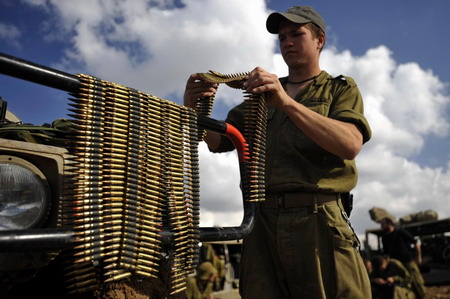GAZA CITY, Gaza Strip -- Israeli troops, some smiling and dancing, began to withdraw from Gaza Sunday after their government and Hamas militants declared an end to a three-week war. But neither side achieved long-term goals and the burden of consolidating the fragile calm fell to world leaders.
The truce brought relief to Gaza's citizens, who took stock of the devastation in relative safety for the first time since Israel launched the offensive on Dec. 27. And it brought more trauma, as rescue workers in surgical masks ventured into what were once no-go areas and pulled 100 bodies from buildings pulverized by bombs.
|

An Israeli soldier hangs up bullets after crossing into Israel from the Gaza Strip January 18, 2009. Hamas said on Sunday it would cease fire immediately along with other militant groups in the Gaza Strip and give Israel, which already declared a unilateral truce, a week to pull its troops out of the territory. [Agencies] |
"We've pulled out my nephew, but I don't know how many are still under there," Zayed Hadar said as he sifted through the rubble of his flattened home in the northern town of Jebaliya.
Tension eased in southern Israel, the target of Palestinian rocket fire, even though Hamas launched nearly 20 rockets in a final salvo before announcing a cease-fire. Three Israelis were lightly wounded, while two Palestinians were killed in last-minute fighting, medics said.
Israel and Hamas do not recognize each other and ended up separately declaring cease-fires 12 hours apart after strenuous efforts by Egyptian mediators to get an agreement. Israel first announced a unilateral cease-fire Saturday night, with Hamas initially vowing to keep fighting until all troops left Gaza. But early Sunday, Hamas too said it would hold its fire to give Israeli forces time to pull out.
Prime Minister Ehud Olmert said his country had no desire to stay in Gaza, a Mediterranean strip of 1.4 million people that was vacated by Israel in 2005 even though Gaza's airspace, coastal waters and border crossings remained under Israeli control.
"We didn't set out to conquer Gaza. We didn't set out to control Gaza. We don't want to remain in Gaza and we intend on leaving Gaza as fast as possible," Olmert said at a dinner in Jerusalem with the leaders of Britain, France, Germany and Spain.
Despite losses suffered, Hamas Prime Minister Ismail Haniyeh claimed "a heavenly victory" in remarks broadcast on Al-Jazeera Arabic news channel.
A swift withdrawal would reduce the likelihood of clashes between militants and Israeli troops that could rupture the truce.

